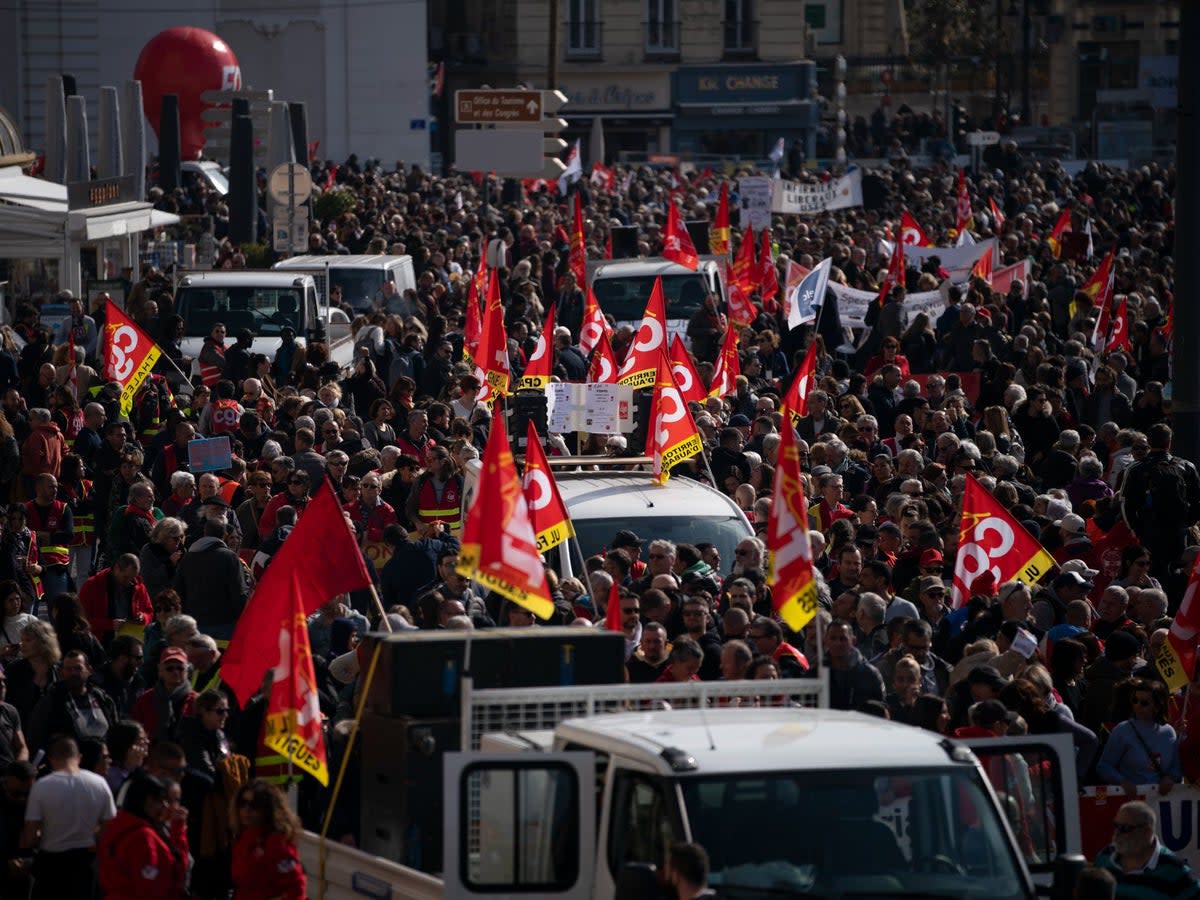Tens of thousands join strikes across France over Macron’s plan to raise pension age

Tens of thousands of workers across France have joined nationwide strikes against president Emmanuel Macron’s proposals to raise the country’s retirement age to 64.
There has been widespread disruption to train services, while teachers have walked out, leaving schools to close. Lorry drivers and rubbish collectors have also joined in – with fuel deliveries also halted – on what is the sixth day of nationwide action this year. The difference this time is that some sectors, including rail unions, have called for rolling strikes. “We will continue until the reform is withdrawn,” the head of the hardline Force Ouvriere (FO) union, Frederic Souillot, told RTL radio. Some rolling strikes have already started locally.
More than 250 protests were expected in Paris and around the country against Mr Macron’s showcase pensions legislation, with the bill under debate in the French Senate this week. Tens of thousands of demonstrators took to the streets in Paris, Marseille, Nice and other cities, including Nantes and Lyon, where some minor clashes with police broke out. Public transport and other services were disrupted in most French cities. In Paris, the Eiffel Tower was closed, as was the Palace of Versailles, west of the capital.
This is a critical time for both sides, since the government is hoping the pension changes will be adopted by parliament by the end of the month, hence some more hardline unions wanting to step up the pressure with rolling strikes for several days.
“I don’t want to work until I’m 64 ... we’re fighting not to lose our rights,” 50-year-old lorry driver Mickael Lormeau told reporters at a protest march in the city of Saint-Nazaire in western France.
“I can understand that not many people want to work two more years, but it’s necessary to ensure the viability of the [pensions] system,” prime minister Elisabeth Borne told France 5 TV. The reforms would raise the minimum pension age from 62 to 64, and require 43 years of work by 2030 to earn a full pension, among other changes.
In Paris, rubbish collectors have begun an open-ended strike, and on Tuesday morning they blocked access to the incineration plant at Ivry-sur-Seine, south of the capital, which is Europe’s biggest such facility. “The job of a rubbish collector is painful. We usually work very early or late, 365 days per year. We usually have to carry heavy weights or stand up for hours to sweep,” said Regis Viecili, a 56-year-old worker.
For those looking to travel, a fifth of flights were cancelled at Charles de Gaulle airport in Paris, along with about a third of flights at Orly airport. Trains to Germany and Spain were expected to come to a halt, and those to and from Britain and Belgium were reduced by a third, according to rail authority the SNCF. Eurostar cancelled more than 20 services to and from London St Pancras International on Tuesday, with a “revised timetable” also running on Wednesday.
France’s leading trade unions have so far acted with rare unity, but the coming days and weeks will be a test of their ability to maintain that united front, particularly if the strikes fragment into local rolling action. The CFDT, now France’s biggest trade union and generally reform-minded, has not committed to the rolling strikes and has said there could be other forms of protest. The CGT and FO unions, which are powerful within the transport and energy sectors, would still be able to bring significant disruption.
“Forcing (the bill) through would spark a crisis,” CGT leader Philippe Martinez said ahead of the protest march in Paris. Opinion polls suggest that a majority of French voters oppose the pension reform bill.
Reuters and Associated Press contributed to this report
